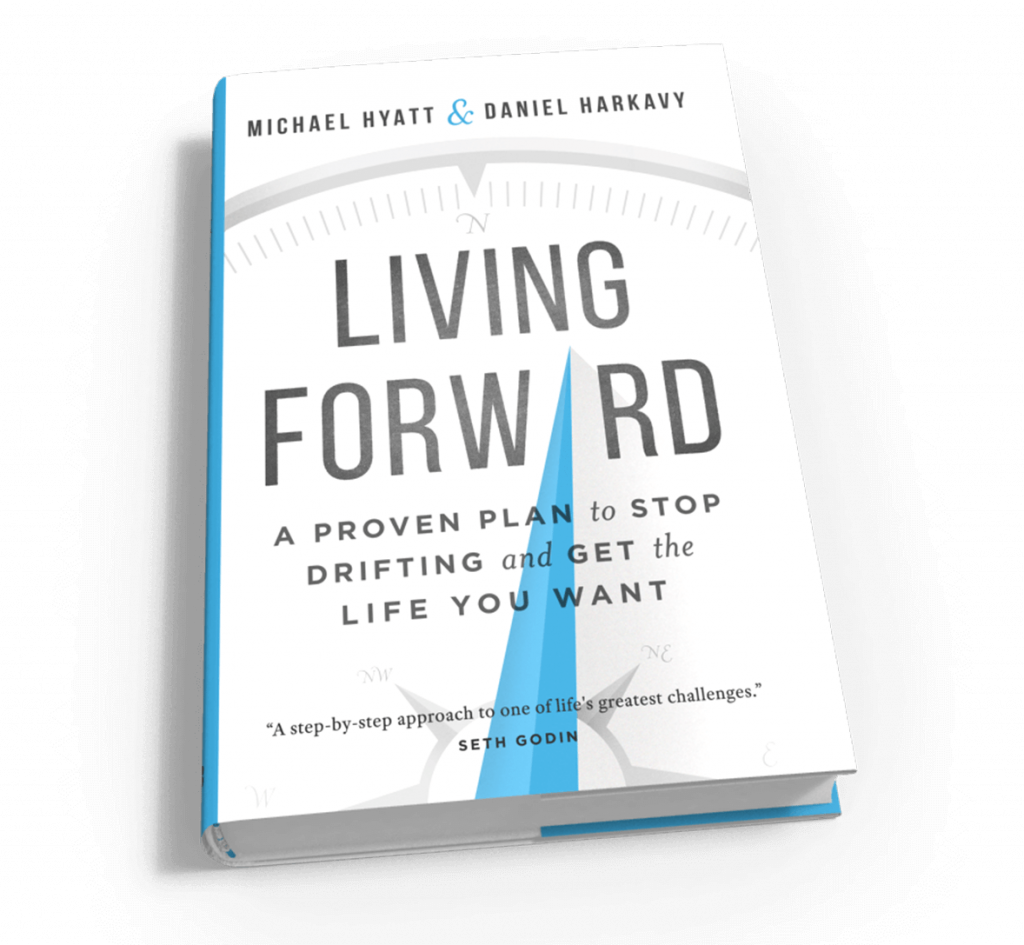
You’ll Hit What You Aim at Every Time
You need a clear vision of where you want to go, or you will just drift through life going nowhere in particular.
In Michael Hyatt and Daniel Harkavy’s book, Living Forward, they propose a plan for being intentional and stopping the drift. They say drifting usually happens for one or more of the following reasons:
- We’re unaware – We simply don’t know what’s happening
- We’re distracted – We aren’t focused on the goals
- We’re overwhelmed – We take on more than we should
- We’re deceived – We are often unconscious about our beliefs compared to reality
“If you aim at nothing, you will hit it every time.” Zig Ziglar

The question of how to organize and plan has come up several times over the past several weeks. I’ve been thinking about it a lot. I wasn’t aware of how intentional I had become about avoiding the drift in my life.
A couple of weeks ago, I started the discussion about getting control of your life. Then I wrote about one of the tools I use for this. I had planned to go into another tool this week (maybe next week) but have decided instead to discuss more about the importance of intentional organization.
I’d forgotten how frustrating it was when I didn’t have a clear plan for where I wanted to go or how I was going to get there.
Most people don’t go to the level of detail with their scheduling as I do and that’s okay. What I’ve been trying to figure out is why many of these same people are frustrated and feel that their lives are out of control. Through several discussions I concluded all scheduling is basically the same.
The difference is in the level if intentionality.

In Ray Edward’s podcast about starting an online business this week, he talks about the three things you must do in order to succeed while avoiding stress and overwhelm. These same things must be done to succeed in life as well.
- Intention – Know what you want, why you want it, and have a plan for getting it.
- Focus – Identify the essential activities for getting there and schedule them.
- Margin – Give yourself time for rest, recreation and reflection.
This sounds a lot like how I schedule my life and my days.
There are studies that show when writing goals down they are more likely to be accomplished. The same thing is true when writing things down on task lists and calendars. You must decide what you want and then take the necessary actions if you are to accomplish it.
Writing things down keeps me accountable to myself.













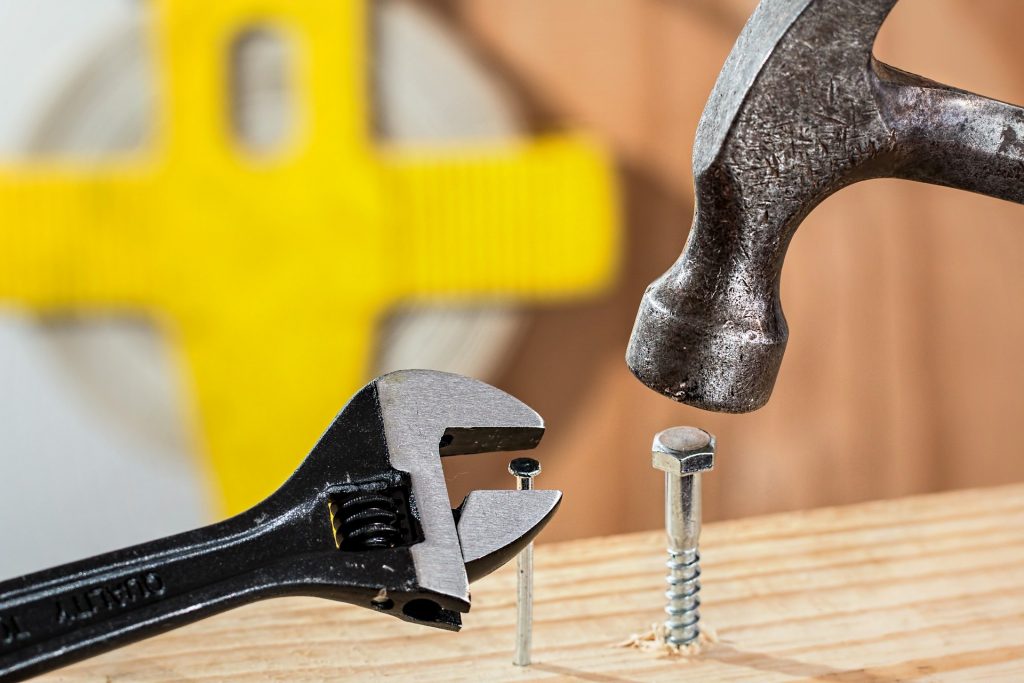




 Quality, honesty and integrity cover this part of the list. These are character issues. They are about choosing to give as much importance to someone else’s needs as I do my own.
Quality, honesty and integrity cover this part of the list. These are character issues. They are about choosing to give as much importance to someone else’s needs as I do my own. The entire issue of construction projects falling apart is unnecessary and unacceptable.
The entire issue of construction projects falling apart is unnecessary and unacceptable.


 One boat began falling behind. Not enough fuel. There had been plenty of coal for the trip, but not enough for a race. As the boat dropped back, an enterprising young sailor took some of the ship’s cargo and tossed it into the ovens. When the sailors saw that the supplies burned as well as the coal, they fueled their boat with the material they had been assigned to transport. They ended up winning the race but burned their cargo. Their cargo was gone, and they couldn’t get it back.
One boat began falling behind. Not enough fuel. There had been plenty of coal for the trip, but not enough for a race. As the boat dropped back, an enterprising young sailor took some of the ship’s cargo and tossed it into the ovens. When the sailors saw that the supplies burned as well as the coal, they fueled their boat with the material they had been assigned to transport. They ended up winning the race but burned their cargo. Their cargo was gone, and they couldn’t get it back.
 Time is a commodity that can only be spent. You can’t add to it, only subtract.
Time is a commodity that can only be spent. You can’t add to it, only subtract.


 We can’t imagine our little snowball having any effect on that big hairy time monster. At first it doesn’t appear that it does, but if we keep after it, it will. Those little wins add up. Being able to see each of these little wins give us an opportunity to celebrate. The more celebrating, the more winning, the more winning, the more celebrating.
We can’t imagine our little snowball having any effect on that big hairy time monster. At first it doesn’t appear that it does, but if we keep after it, it will. Those little wins add up. Being able to see each of these little wins give us an opportunity to celebrate. The more celebrating, the more winning, the more winning, the more celebrating.

 Scheduling and planning accurately are a difficult (practically impossible) thing to get right. This includes not keeping appointments with ourselves. I don’t know about you, but I’m much more intentional about being on time to a meeting with someone else…not so much when I’m meeting with me.
Scheduling and planning accurately are a difficult (practically impossible) thing to get right. This includes not keeping appointments with ourselves. I don’t know about you, but I’m much more intentional about being on time to a meeting with someone else…not so much when I’m meeting with me. Things take longer than planned – We have all experienced things taking twice as long, or more, to do than we expected. This is called the
Things take longer than planned – We have all experienced things taking twice as long, or more, to do than we expected. This is called the 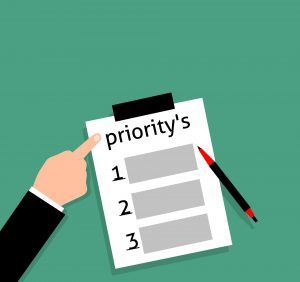 Too many things on the list – This is another common problem. Most of us have said yes to too many things. There are so many good things that we need or want to do. The more things we think about the harder it is to focus on one thing. This, like the previous point, pushes us harder to get the things on the list done, even though we know we won’t be able to do them all. Having too many things on the list leads me to the next cause for schedules to go wrong.
Too many things on the list – This is another common problem. Most of us have said yes to too many things. There are so many good things that we need or want to do. The more things we think about the harder it is to focus on one thing. This, like the previous point, pushes us harder to get the things on the list done, even though we know we won’t be able to do them all. Having too many things on the list leads me to the next cause for schedules to go wrong. Distractions and interruptions – Our busy lives are full of these, whether self-inflicted or from outside sources. In this fast-paced digital age, there has never been more opportunities to be distracted. The previous two things are more internal than this one. It doesn’t mean that we don’t have any control, it just means that it often comes from outside sources. These can play havoc on our schedules if we allow them.
Distractions and interruptions – Our busy lives are full of these, whether self-inflicted or from outside sources. In this fast-paced digital age, there has never been more opportunities to be distracted. The previous two things are more internal than this one. It doesn’t mean that we don’t have any control, it just means that it often comes from outside sources. These can play havoc on our schedules if we allow them.


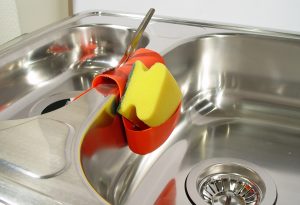 Clean garbage disposals – Put a little vinegar in an ice cube tray, add some water and freeze, then run some cubes through the disposal. Follow up with a little baking soda and warm water. The ice cubes will sharpen the blades, the vinegar and baking soda will break down food and grease build up and will leave it smelling fresh and clean.
Clean garbage disposals – Put a little vinegar in an ice cube tray, add some water and freeze, then run some cubes through the disposal. Follow up with a little baking soda and warm water. The ice cubes will sharpen the blades, the vinegar and baking soda will break down food and grease build up and will leave it smelling fresh and clean. Clean faucet aerators and shower heads – Dirty aerators on the end of your faucets and in shower heads can mean limescale and sediment are blocking the flow and water pressure. Unscrew the aerators and shower heads, remove the aerator and/or screen, soak them in a 50/50 vinegar/water mixture for 30 minutes or until clean, rinse and reinstall. Be careful to pay attention to the order and direction the parts come apart so that you can put them back together correctly.
Clean faucet aerators and shower heads – Dirty aerators on the end of your faucets and in shower heads can mean limescale and sediment are blocking the flow and water pressure. Unscrew the aerators and shower heads, remove the aerator and/or screen, soak them in a 50/50 vinegar/water mixture for 30 minutes or until clean, rinse and reinstall. Be careful to pay attention to the order and direction the parts come apart so that you can put them back together correctly. Lubricate and test overhead garage door – Garage doors have moving parts that should be lubricated. With the door closed clean dirt and debris from the track. Use a lithium-based aerosol and spray rollers, bearings and other moving parts of the door and opener (chain or threaded rod). Your garage door should have stop and auto reverse motion detection to sense if an object is in its path. Get a 2×4 piece of wood and place it underneath the open door, then close the door using the opener button. The door should stop closing once it detects the wood and go back up. Also test the photo-electric sensors by moving something in front of them while the door is coming down, it should reverse direction and go back up.
Lubricate and test overhead garage door – Garage doors have moving parts that should be lubricated. With the door closed clean dirt and debris from the track. Use a lithium-based aerosol and spray rollers, bearings and other moving parts of the door and opener (chain or threaded rod). Your garage door should have stop and auto reverse motion detection to sense if an object is in its path. Get a 2×4 piece of wood and place it underneath the open door, then close the door using the opener button. The door should stop closing once it detects the wood and go back up. Also test the photo-electric sensors by moving something in front of them while the door is coming down, it should reverse direction and go back up.
 The complete list can certainly seem overwhelming. This is a big part of why routine maintenance gets overlooked. If you break it down into the individual tasks, spread them out and schedule them, it’s doable, like eating an elephant one bite at a time.
The complete list can certainly seem overwhelming. This is a big part of why routine maintenance gets overlooked. If you break it down into the individual tasks, spread them out and schedule them, it’s doable, like eating an elephant one bite at a time.

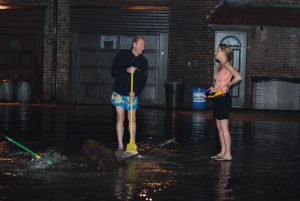 With everything else going on in life, how can we remember one more thing? We don’t have to if we have a scheduled plan. First you need to decide if home maintenance is important enough for you to bother with. If it doesn’t bother you when you’re forced to deal with a big problem, then don’t worry about it. You’ll know the sump pump has quit working when you replace the carpet, baseboard and lower portion of the sheetrock in your basement.
With everything else going on in life, how can we remember one more thing? We don’t have to if we have a scheduled plan. First you need to decide if home maintenance is important enough for you to bother with. If it doesn’t bother you when you’re forced to deal with a big problem, then don’t worry about it. You’ll know the sump pump has quit working when you replace the carpet, baseboard and lower portion of the sheetrock in your basement.